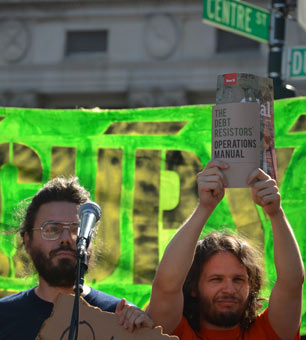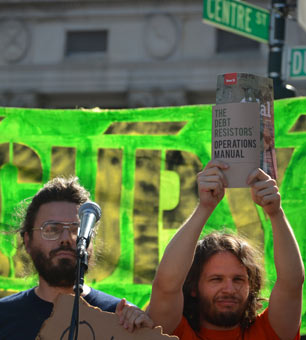 (Photo: Steve Rhodes / Flickr)Medical debt is the cause of 62 percent of bankruptcies, say organizers of Strike Debt, which threw last night’s offbeat fundraiser for their new “Rolling Jubilee.” Ordinary people donated enough money to collectively buy an estimated $5.9 million in bad debt in order to cancel it.
(Photo: Steve Rhodes / Flickr)Medical debt is the cause of 62 percent of bankruptcies, say organizers of Strike Debt, which threw last night’s offbeat fundraiser for their new “Rolling Jubilee.” Ordinary people donated enough money to collectively buy an estimated $5.9 million in bad debt in order to cancel it.
On the first anniversary of Occupy Wall Street’s eviction from Zuccotti Park, celebrity and local performers donated their time for a “post-modern variety show” last night at Manhattan’s Le Poisson Rouge nightclub. They were there to raise money for what may be the most far-reaching project to grow out of the Occupy movement so far: a “bailout for the 99 percent” called Rolling Jubilee. Launched by Strike Debt, an offshoot of OWS, the Jubilee has begun erasing people’s medical debt by infiltrating the debt-collection industry.
The tactic is to buy private debt the same way collection companies do—on the debt market, at tiny fractions of its original worth—and then cancel it in hopes of freeing debtors from their piled-up medical bills. It is hoped that the action will bring debt servitude to the forefront of our national conversation.
Last night’s live-streamed spectacle, billed as the People’s Bailout Telethon, featured comedienne Janeane Garofalo, musicians Lee Ranaldo of Sonic Youth and Jeff Mangum of Neutral Milk Hotel, and a three-hour-long vaudevillian line-up of mariachi and magic, gospel and hip-hop, striptease and performance art. Comedy writer Lizz Winstead and cartoonist David Rees emceed the event, badgering a fluctuating online audience to donate money. With local Strike Debt chapters holding viewing parties across the country, there may have been close to 2,000 online viewers.
The event had been planned as a launch party for Rolling Jubilee, which opened its bank account on Friday, November 9. But as donations surged past the $250,000 mark—five times Strike Debt’s stated goal for the evening—the soirée took on the bubbly energy of a victory rally. Organizers say these donations could buy 20 times their amount in debt, since distressed medical debts (that is, debts seen as unlikely to be paid) can sell for as little as five cents to the dollar. In other words, a collection company might pay a hospital $10 for the right to chase down a patient’s $200 debt. Or, in the case of Rolling Jubilee, a $10 donation could cancel a $200 debt. According to Yates McKee, a Strike Debt organizer, the group has “friends in the industry” with debt-purchasing experience who are bidding discreetly on the group’s behalf.
Of the money raised this week, Strike Debt has already spent $5,000 on purchasing medical debt. Sometime soon, the first households will receive letters informing them that their debt has been cancelled, along with copies of a “Debt Resistor’s Operation Manual.”
According to the federal Consumer Financial Protection Bureau, about 30 million Americans have debts in collection—with tabs averaging $1,500. So, if the roughly $293,000 raised this week can indeed purchase $5.9 million of debt, this phase of the bail-out could help about 3900 families.
McKee emphasizes that the campaign is not about charity, but “solidarity and mutual aid.” Nor is the campaign calling for debt “forgiveness,” which reinforces the notion that debtors are guilty of moral failures. Instead, it encourages debt resistance. After all, “We’re calling for this to be a political act of economic non-compliance,” he told me. “We are intentionally withdrawing our consent from this system.”
It may sound like a stretch to call this form of activism “resistance.” A few online commenters have suggested that it validates the debt collection system by using its channels. But Strike Debt views the Rolling Jubilee as just one tactic in a long-term strategy to empower debtors. Others include the creation of a Debt Resistors Organizing Kit, and debt-resisting acts of civil disobedience. “We realized that debt was really the tie that binds the 99 percent,” said Pamela Brown, an organizer with the Occupy Student Debt campaign. “It’s the intersection of Wall Street and our lives.”
While the campaign is focused on the problem of the personal debts many of us rack up in pursuit of education, health care, and housing, Strike Debt activists have only been able to purchase medical debt at this point. It’s a worthy focus—Strike Debt says medical debt directly causes 62 percent of all bankruptcies. Student debt, which in the U.S. amounts to a staggering $1 trillion, has proven a difficult target because federally backed student loans cannot be bought (though McKee says the campaign may find ways to buy up private college loans or for-profit school loans). Strike Debt cannot seek out and buy defaulted debt from specific people, since anonymous accounts are sold in bundles. “With 15 percent of Americans currently being pursued by a debt collector, looking for one person’s debt would be like looking for a needle in a haystack,” their website says.
Strike Debt is hoping that lessons from last fall’s occupations will help promote common cause among the 99 percent. McKee wants to see an existing “invisible army of defaulters” recognize each other as co-combatants and engage the debt system together. Perhaps that will happen when Jubilee’s good-news envelopes start landing in mailboxes.
Join us in defending the truth before it’s too late
The future of independent journalism is uncertain, and the consequences of losing it are too grave to ignore. To ensure Truthout remains safe, strong, and free, we need to raise $41,000 in the next 5 days. Every dollar raised goes directly toward the costs of producing news you can trust.
Please give what you can — because by supporting us with a tax-deductible donation, you’re not just preserving a source of news, you’re helping to safeguard what’s left of our democracy.
